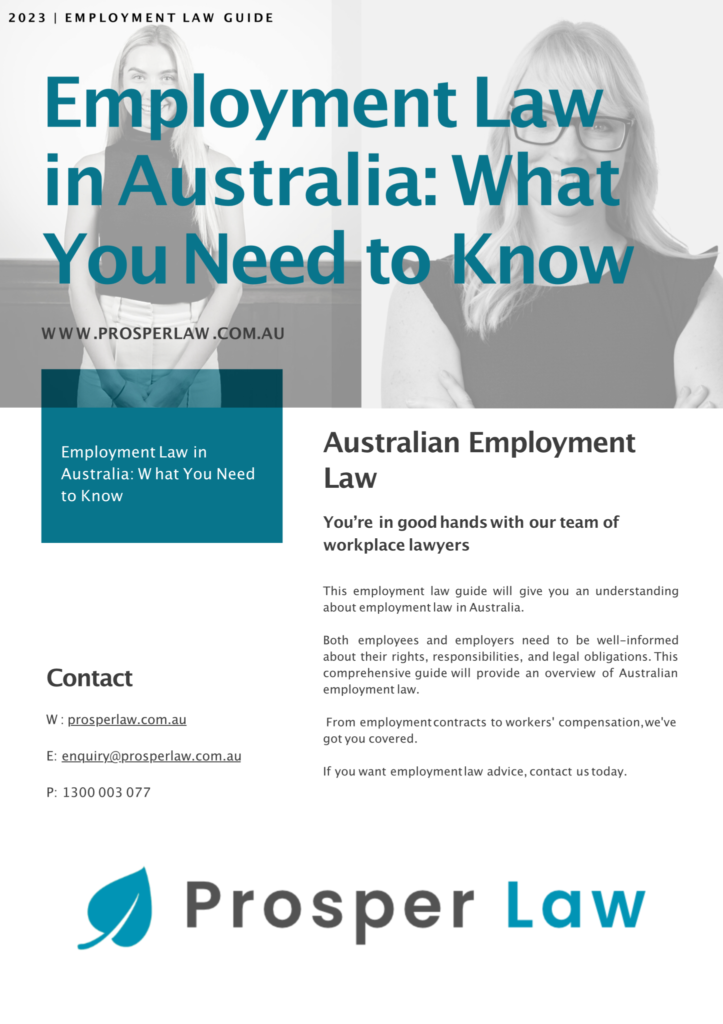The Fair Work Legislation is one of Australia’s most significant employment laws, and the ever-evolving workforce makes the legislation even more complex.
Recently, the Fair Work Legislation Amendment (Secure Jobs, Better Pay) Act 2022 (Cth) was enacted on December 6 2022, providing for a series of employment and industrial relations reforms that will be phased in over 2023.
In this article, Micaela Diaz, a workplace lawyer at Prosper Law, will explain what you need to know about the reforms and how they will affect the industrial relations landscape and your business.
Fair Work Legislation Amendment (Secure Jobs, Better Pay) Bill 2022
Some key changes made in the Fair Work Act 2009 (Cth) include:
- a crackdown on fixed-term contracts, especially rolling fixed-term contracts.
- new prohibitions on pay secrecy clauses.
- changes to multi-employer agreements.
- new bargaining rules for single-interest enterprise agreements.
- additional anti-discrimination measures.
Let’s discuss all these changes in detail one by one.
Pay Secrecy Clauses
Pay secrecy clauses prohibit employees from discussing their salary and remuneration. These clauses often direct employees to not discuss their pay with their coworkers.
What is the amendment?
Pay secrecy clauses are now illegal in Australia. The Fair Work Legislation Amendment (Secure Jobs, Better Pay) Act 2022 gives employees a ‘workplace right’ to ask other employees about their pay or disclose their salary to other staff members.
Impact on Employers
Because such disclosure is now considered a “workplace right” under the Fair Work Act, employers cannot include pay secrecy clauses. Those clauses are prohibited in employment contracts or other written agreements that are inconsistent with the new workplace rights.
As a result of these changes, employers should have their employment contracts reviewed by a workplace lawyer to ensure that they do not include any pay secrecy clauses. Further, it is advisable to consider whether any changes to employee compensation are necessary. For example, employers might want to look more closely at the issue of unequal pay inequality in their workplace.
Impact on Employees
Pay secrecy clauses in existing employment contracts no longer have any legal effect and are banned from being included in future contracts. Employees now have a workplace right (protected by law) to discuss their remuneration with one another openly.
However, employees cannot be forced to give this information to other workers if they don’t want to do so. Moreover, employees may exercise these rights even after they leave employment.
When does the amendment come into effect?
Any employment contract entered into or amended on or after December 7, 2022, shall acquire such rights on entering into that contract.
However, for some employment contracts, the new legislation has created three levels of commencement:
| Employment contracts entered into before December 7, 2022 | Contracts entered into before that date remain valid but are no longer enforceable if the contract is amended. |
| Employment contracts on or after December 7, 2022 | This clause is not enforceable and has no effect. |
| Employment contracts on or after June 7, 2023 | Pay-secrecy terms will be banned from this date. Employers who violate this prohibition will be subject to penalties. |
Changes to flexible work and unpaid parental leave requests
Flexible work
Currently, an employee can request a flexible working arrangement under the Fair Work Act when they have had 12 months of service and they:
- are the parent or have responsibility for the care of a child who is school-aged or younger
- are a carer (under the Carer Recognition Act 2010)
- have a disability
- are 55 or older
- are experiencing family or domestic violence; or
- provide care or support to a member of their household or immediate family who requires care and support because of family or domestic violence.
What is the amendment?
These criteria will continue to apply, however under these changes, an employer who receives a request for flexible working arrangements will now need to:
- meet with the employee and genuinely try to reach an agreement.
- have regard to the consequences of any refusal of the request on the employee; and
- provide detailed reasons for any refusal (which must still be based on reasonable business grounds); and
- inform the employee of any alternative working arrangements you would be willing to make instead to accommodate the employee’s circumstances.
What is the impact on Employers?
Employers can refuse on reasonable business grounds but must first consult and try to reach an agreement.

What is the impact on Employees?
Employees can now refer disputes about their requests to the Fair Work Commission.
Pregnant employees and those experiencing domestic violence are now eligible to make flexible work requests.
Unpaid parental leave requests
Earlier, when an employee made a request to extend their unpaid parental leave, the employer could:
- agree to the request, or
- discuss and agree with the employee to a different extension period.
What is the amendment?
The new legislation changes how employers must respond to requests for extending unpaid parental leaves.
If the employer chooses to refuse the request to extend unpaid parental leave, they must:
- respond to the request in writing within 21 days
- only refuse a request if:
- they have discussed and genuinely tried to reach an agreement with the employee about an extension but have not reached an agreement
- they have considered the consequences of refusing the extension
- the refusal is on reasonable business grounds.
The written response needs to:
- include details of the reasons for refusal, including the employer’s particular business grounds and how those grounds apply to the request
- state an alternative period of extension the employer would be willing to agree to or that there isn’t any extension they would agree to
- include the new dispute resolution provisions that the Commission will have.
What is the impact on Employers?
Employers must respond to a request in writing within 21 days and if it is refused, specify reasons for the refusal.
What is the impact on Employees?
Employees are entitled to granting of unpaid parental leave requests in excess of 12 months, unless there are reasonable business grounds for refusal.
When does the Fair Work legislation amendment come into effect?
From 6 June 2023.
Fixed Term Contracts
Fixed-term employment contracts are contracts that terminate after a specified period of time (e.g. two years) or after the completion of a specific task or project.

Once the employment agreement ends, it gives employers the ability to ‘end’ an employee’s employment without the need to:
- give any reason for termination,
- provide notice of termination,
- pay any redundancy (if the position is no longer required to be performed by anyone).
What is the amendment?
Fair Work Legislation makes it unlawful for an employer to enter into a fixed-term contract with an employee where:
- the term of the contract is greater than two years; or
- the original term of the contract plus any renewal period is greater than two years; or
- there is an option or right to renew the contract more than once (irrespective of the period of the original term and the term of any renewals).
The exceptions, where fixed-term contracts may continue to be used, include where following:
- the employee is engaged to perform only a distinct and identifiable task involving specialised skills.
- the employee is a trainee engaged under a training arrangement with an RTO;
- the employee is engaged to undertake essential work during a peak demand period;
- the employee is engaged to undertake work during emergency circumstances or a temporary absence of another employee;
- in the year the contract is entered into, the employee’s earnings under the contract exceed the high-income threshold for that year;
- the contract is for a position funded in whole or in part by government funding, the funding is payable for more than two years, and there are no reasonable prospects that the funding will be renewed.
What is the impact on Employers?
Employers who wish to retain employees for over two years will need to engage these employees under permanent ongoing contracts, which will have major implications for many employers currently relying on rolling fixed-term contracts.
Therefore, employers should consider whether those contracts are necessary and seek advice from a workplace lawyer on whether long-term or back-to-back arrangements will be lawful once the changes take effect.
What is the impact on Employees?
Employees who are offered a fixed-term contract after the amendment comes into effect should be aware of their rights. Any employee on a rolling fixed-term contract should ensure they are offered a lawful contract once the amendment comes into effect.

Anti-Discrimination protections
Discrimination occurs when people are treated differently because of an attribute to advantage some people and disadvantage others on the basis of that attribute. These attributes can be sex, disability or race.
What is the amendment?
The new Fair Work legislation includes more protected attributes at work. These are:
- breastfeeding
- gender identity
- intersex status.
What is the impact on Employers?
Employers are prohibited from taking adverse action against current or future employees because of the newly added attributes as well.
What is the impact on Employees?
Any employee who experiences adverse action because of these attributes may be able to make a complaint through the Fair Work Commission.
Moreover, the Act now empowers the Fair Work Ombudsman to start court proceedings for alleged breaches relating to the new protected attributes.
Sexual Harassment
Sexual harassment describes a wide range of unwelcome behaviour of a sexual nature that could reasonably be expected to make a person feel offended, humiliated or intimidated.
What is the Fair Work legislation amendment?
The amendments in the Fair Work legislation implement some of the recommendations in the Respect@Work Report, including recommendation 28, by introducing a broad prohibition against sexual harassment in connection with work.
The prohibition applies to the wider definition of ‘worker’ under the Work Health and Safety Act 2011 (Cth), including individuals carrying out work in any capacity for a person conducting a business or undertaking (including, for example, employees, trainees, apprentices, contractors and volunteers).
What is the impact on Employers?
Employers can be held liable for sexual harassment in the workplace unless they can demonstrate policies and reasonable steps to prevent it.
What is the impact on Employees?
Employees who are sexually harassed in the workplace may apply to the Commission for compensation and employer penalties through the Commission.
When does the Fair Work legislation amendment come into effect?
7th January 2023.

Enterprise Agreements
Termination of enterprise agreements after the nominal expiry date
The circumstances in which enterprise agreements can be terminated after the nominal expiry date has changed. Previously, the Commission would terminate the agreement if it was satisfied that termination was appropriate in all the circumstances and not contrary to the public interest.
Under the new system, the Commission must terminate the agreement if:
- the continued operation of the agreement would be unfair to the employees; or
- the agreement does not and is unlikely to cover any employees; or
- the continued operation of the agreement would pose a significant threat to the viability of the business (but only if the termination of the agreement reduces the risk of employees losing their jobs, and the employer preserves any termination of employment entitlements under the agreement).
Impact of the change
The effect of these changes is that it is harder for employers to terminate an enterprise agreement as a bargaining tactic, and much easier for an employee or union to terminate an enterprise agreement which has unfair impacts.

Sunsetting of zombie agreements
Pre-Fair Work Act enterprise agreements will automatically terminate on 7 December 2023. Employers can apply for an extension of this date, but only if their agreements are still beneficial to employees.
Impact of the change
Employers will have to notify their employees on or before 7 June 2023 of the projected termination date for these agreements. This means employers who rely on Work Choices-era agreements will need to start looking at new enterprise agreements or paying based on award conditions.
Errors in enterprise agreements
The Commission will have new powers to correct errors in enterprise agreements on its own initiative or on application by an employer, employee or union covered by the agreement. This takes effect from 7 December 2022. The Commission will have the power to decide how these corrections are made to an agreement.
The Commission will also have the power to validate a decision to approve an agreement or a variation to an agreement if the wrong version was mistakenly submitted for approval. This applies to approvals given by the Commission before, on, or after 7 December 2022. The validation process could start on the Commission’s initiative or on application.
Amending enterprise bargaining rules to reduce onerous processes
There are changes to how bargaining for a new agreement can be initiated. In certain circumstances, an employee can initiate bargaining by writing to their employer via a bargaining representative. This can be done when the employer has a single enterprise agreement that has passed the nominal expiry date. The Commission can make a bargaining order following a request, even where the employer has refused to agree to bargain.
Impact of the change
The Act now simplifies the requirements that must be met before the Fair Work Commission can be satisfied that employees have “genuinely agreed to” the agreement by eliminating some of the strict pre-approval steps currently in place, including:
- the arbitrary seven-day ‘access period” that requires certain steps to be taken within that period;
- requiring employers entering into a single-employer agreement, supported bargaining agreement, or cooperative workplace agreement to provide employees with a ‘notice of employee representation rights’ and removing the restriction that the vote on that agreement cannot occur until 21 days after negotiations begin (single enterprise agreement negotiations must still comply with current NERR requirements).
The Act removes the complexity of the Better Off Overall Test (BOOT). Instead, it focuses on a global assessment of whether each employee would be better off overall if the enterprise agreement is applied. It also limits the circumstances under which a unilateral request for a time limit may be made.
Expanding options for multi-employer bargaining to promote wage growth
The changes in Fair Work legislation aim to achieve expanded multi-employer bargaining through:
- Single-interest bargaining: ‘Single interest employers'(e.g., related companies, joint ventures) no longer require ministerial approval to negotiate single-interest employer agreements. Employees may apply for single-interest authorization without their employer’s consent if they have more than 20 employees and there is no current or recently expired enterprise agreement.
- Supported bargaining: Supported bargaining will replace low-paid bargaining with simplified provisions – the need to convince the Commission that they are appropriate is much simpler than the previous ‘public interest’ requirement.
- Cooperative bargaining: Cooperative workplaces, as defined in previous legislation, have new options for adding or removing employers from the agreement.
When does the amendment come into effect?
6th June 2023, or earlier by government proclamation.
How can Prosper Law help?
Prosper Law is Australia’s online law firm. We provide legal advice to businesses and individuals across Australia. Our legal practice areas include contracts, eCommerce, publishing, legal counsel and employment law.
If you need to talk to a workplace lawyer, get in touch today.
Contact the team at Prosper Law to discuss how we can provide you with legal advice for a fixed fee or at affordable hourly rates.




